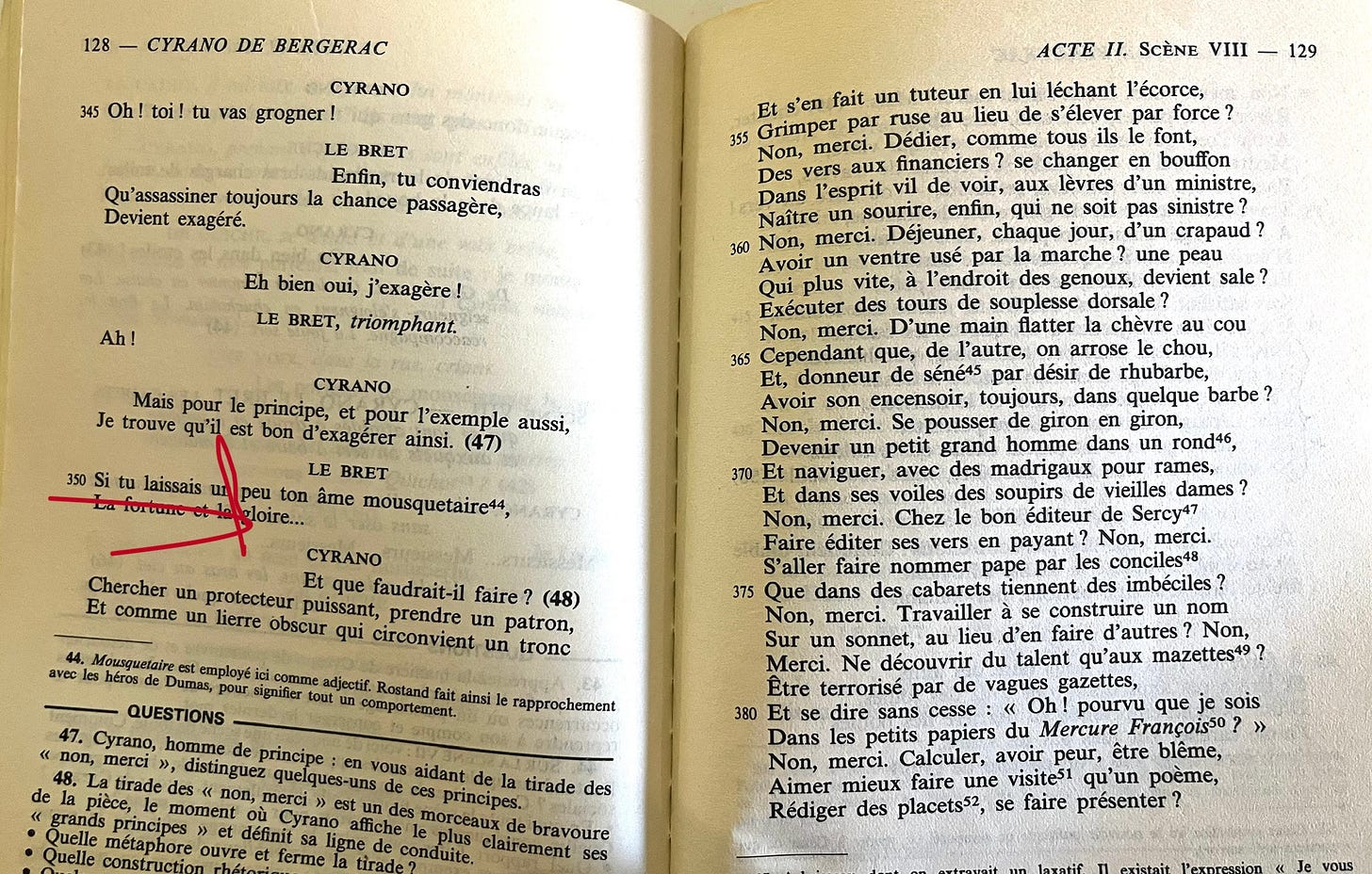Since I put up the Roxanne FCC post today on Zuko’s Musings proper, I feel like revisiting my Cyrano translations again, also because today I need a cheat.
This is commonly called the ‘non merci’ speech, and you can see why, looking at either the original French or my translation. I mentioned my clever little trick in my last Cyrano selection, that I used in order to give an English speaking reader the idea and the feel of the original’s all-rhyming verse, without sounding too sing-songy. I decided to take a lesson from Shakespeare, who rhymed sometimes but not all the time, and who used a meter that’s the most like natural English speech rhythms: iambic pentameter. So what I did with Cyrano was: I used mostly blank verse, and then peppered rhyming couplets throughout, in places where there was a rising dramatic build, or a climactic emotion, or that kind of thing.
This chunk has a repeated refrain of ‘non, merci’ or, ‘no, thank you’ and so I used that as a placement signal for my sporadic rhymes. I think it sounds great—what do you think?
CYRANO:
And what should I do?
Look for a powerful protector, take up a sponsor,
Like the dark ivy encircling a tree,
Propping itself up on it, licking its bark,
Not rising by force, but by ruse, [in the dark?]
No, thank you. Dedicate, as they all do,
One’s verses to bankers? Change oneself into a buffoon
In the base hope of seeing, on the lips of some minister,
A smile blooming, finally, that is not sinister?
No, thank you. Breakfast, each day, on a toad?
Have a stomach used up by the street?—the skin
On the knees, to become dirty the quickest?
Do daily back-bends, [for servility of the fittest?]
No, thank you! With one hand stroke the goat’s neck,
While, with the other, one waters the cabbage?
[Shovel on the flattery for want of rewards?]
Purge one’s compliments, hoping some suit [isn’t bored?]
No, thank you. Push oneself from place to place,
And become grand in the eyes of some little book club?
To navigate with madrigals for oars
And in one’s sails the sighs of dowagers [and whores?]
No, thank you. Let the good publisher Sercy [do]
What he likes with one’s lines for pay? No, thank you.
Let oneself be named pope with prizes [and frills]
That, in the cabarets they give to imbeciles?
No, thank you. Labor to construct a reputation on
One sonnet, instead of making another one? No,
Thank you. To find no talent but in mediocrities,
And, terrorized by the vague gazettes,
Say to oneself ceaselessly, “Oh! If only I could get [my paw]
“In the little papers of the Mercure Francois?”
No, thank you. Calculate, be afraid and pale,
Loving better a party than a poem, [or a sword to take its toll?]
[Write sonnets begging bread from kings? Sell my own soul?]
No, thank you! No, thank you! No, thank you! But…
…To sing,
To dream, to laugh, to pass through, to be alone, to be free,
To have an eye that sees well, a voice that carries,
To wear, when one likes, one’s hat at an angle,
For a yes, for a no, to fight—or write a line!
To work without need of glory or fortune,
Go on that journey, wherever one likes—even to the moon!
To never write anything that didn’t come from oneself,
And, modest throughout, to tell oneself: my friend,
Be satisfied with flowers, fruit, even plain leaves
If it’s in your garden, yourself, that you harvest them.
And if a little triumph happens, by chance,
You don’t have to render anything unto Caesar.
Face to face with yourself, guard your own merit.
In brief, disdain the role of the parasite vine.
True, one isn’t the oak or tall linden[’s dome],
Not growing very high, perhaps, but all alone.






Brilliant!